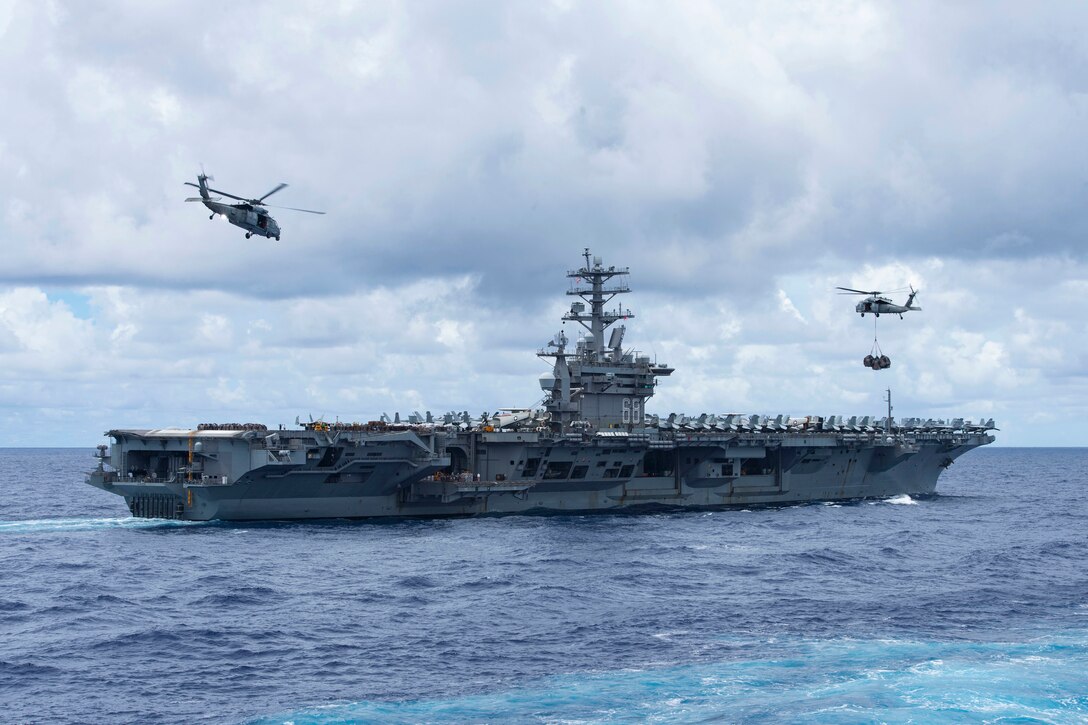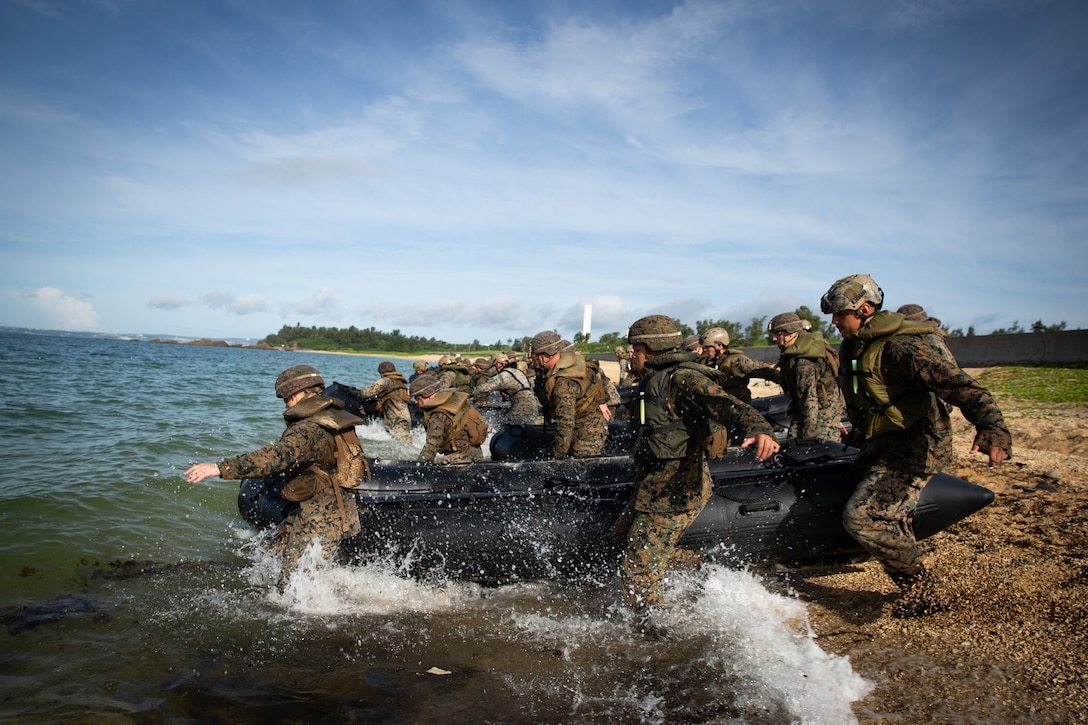Two Navy MH-60S Seahawk helicopters conduct a vertical replenishment with the USS Nimitz in the Philippine Sea, July 13, 2020.
Providing up-to-date information, news and original content on American Military issues.
Tuesday, July 14, 2020
Craft Competition
Marines dash into the water carrying a combat rubber raiding craft during a squad competition in Okinawa, Japan, July 7, 2020. The competition tested the Marine’s ability to maneuver the craft and demonstrate safe capsize procedures.
Guardsmen Assist Ohio's COVID-19 Testing Effort
Airmen assigned to the Ohio Air National Guard's 178th Wing augmented the staff of Centerpoint Health at the Community Building Institute in Middletown, Ohio, to help with drive-thru coronavirus testing of the local community.
The airmen worked alongside Ohio Army National Guard medics from the 174th Air Defense Artillery Brigade and the 285th Medical Company. Teamed up in groups of two, they were in charge of verifying patient information, performing nasal swab COVID-19 testing and properly packaging and storing the testing specimens. The guardsmen partnered with Centerpoint Health personnel who were in charge of facilitating the drive-thru testing event and getting patients checked in.
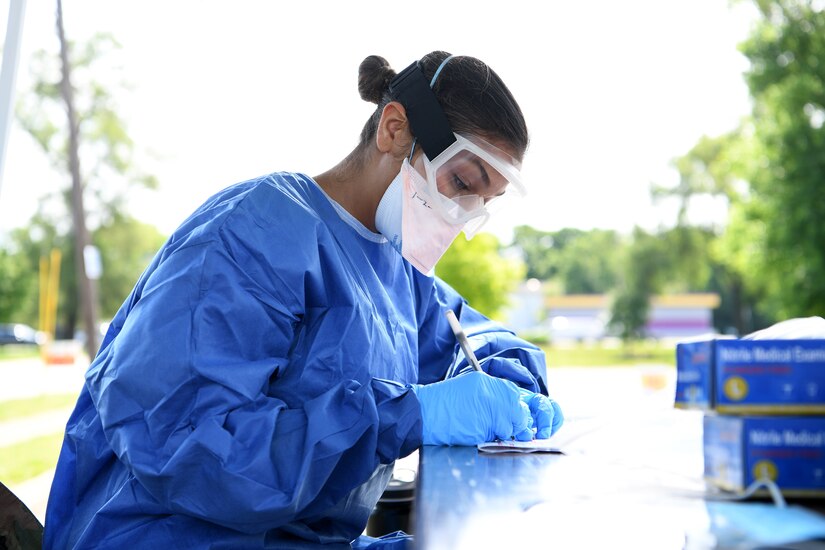
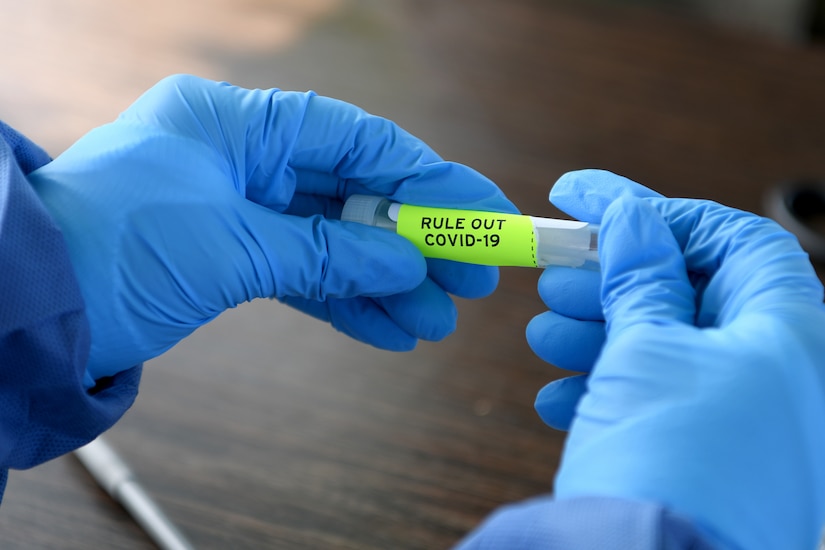
Air Force Senior Master Sgt. Sarah Berzes-Vaughn, the superintendent of Dental Services in the 178th Medical Group, served as the squad team lead and helped facilitate the community testing while overseeing the guardsmen involved in the effort. Air Force Staff Sgt. Christina Pumphrey, a medical technician assigned to the 178th Medical Group, Air Force Staff Sgt. Luis Morales, a dental technician assigned to the 178th Medical Group, and Air Force Tech. Sgt. Diane Broadnax, a medical technician assigned to the 123rd Air Control Squadron, verified patient information and performed the COVID-19 nasal swab tests.
"The community members check in with Centerpoint Health, and they are given a bag and lab requisition form," Berzes-Vaughn said. "Once they get to the testing pod, they'll be swabbed in each nostril, and then the swab goes into the reagent. Then we'll make sure the patient identifiers are on the sample and properly stored until they are ready to be sent to the lab."
On June 11, Gov. Mike DeWine announced that anyone in Ohio could receive a coronavirus test, even if they were low-risk or not showing symptoms. Recent data showed an upward trend in cases in southwest Ohio, and this prompted the creation of pop up testing sites statewide. With the increased demand for individuals seeking a test, the Guard members were able to support to their fellow Ohioans.
"[The testing] is going to be able to save lives by being able to do contact tracing," Berzes-Vaughn said. "It's really important for us to be able to help out our community."
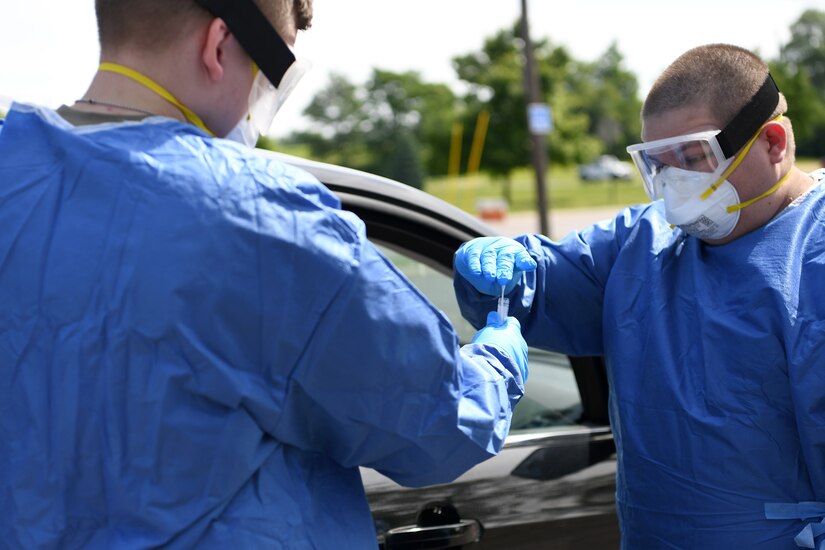
"It's been a great opportunity to be out in the community and talking to patients that come through the drive-thru for testing," Morales said. "I think it’s important for us to come out here and help out the community in a time of need."
It's important for the National Guard to be out in the community. "Coming out here and helping out lets them know that we are here to help our state and our country in times of need," she said. "Being able to give back is the reason why I joined the Guard. I am thankful for this opportunity to help out in any way that I can."
(Air Force Staff Sgt. Amber Mullen is assigned to the 178th Wing.)
Guardsmen Bring Food, Hope to Community During COVID-19
Guardsmen assigned to the 2-130th Airfield Operations Battalion and the 1-130th Attack Reconnaissance Battalion worked together with local organizations to help feed citizens during COVID-19.
"It's a very humbling experience," Army Sgt. 1st Class Jason Norris, assigned to the 1-130th ARB, said. "You actually get to see, face to face, the families that you're helping."
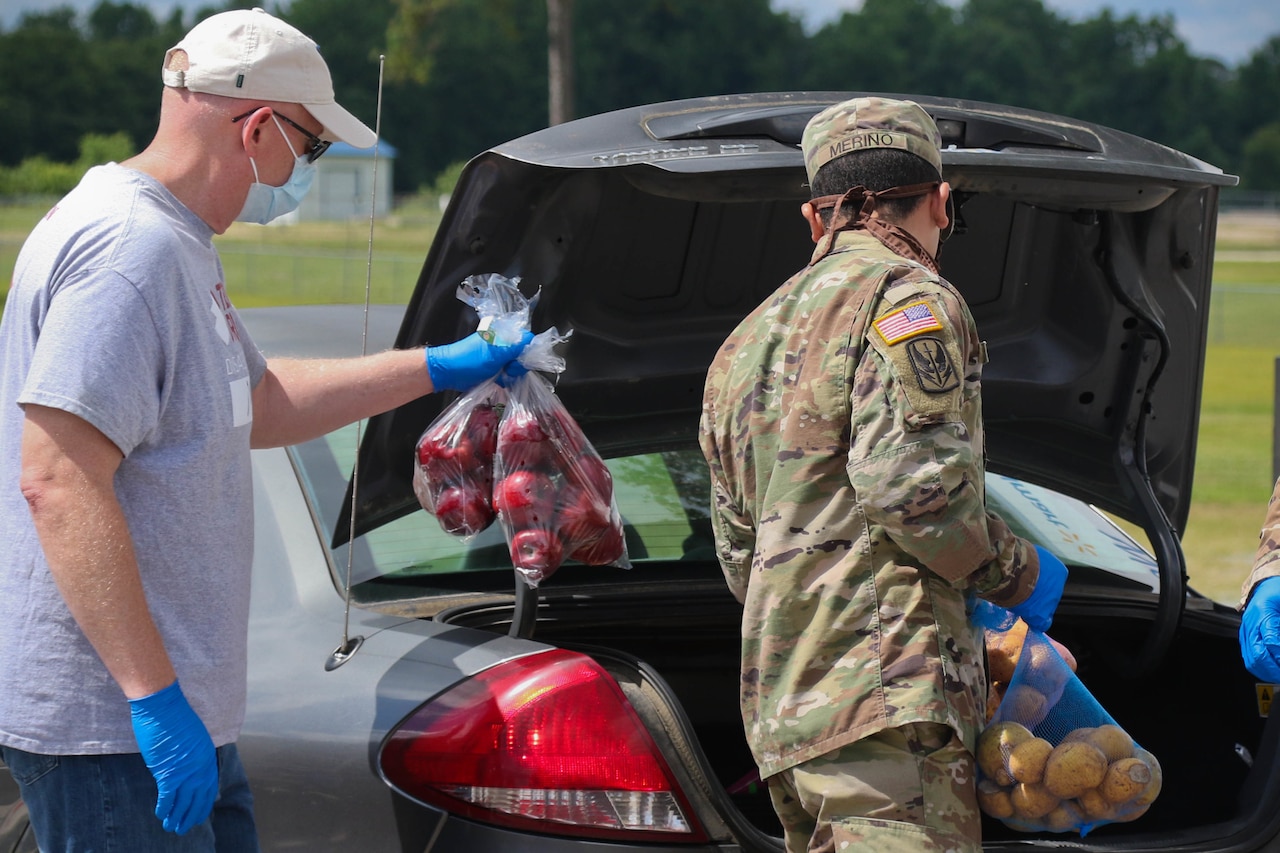
The guardsmen helped distribute meals and fresh produce such as potatoes, apples, watermelons, oranges, lettuce and meat.
As food rations dwindle and unemployment rises, families have found themselves in difficult circumstances. Therefore, the Guard is working with state agencies and local food banks to help support COVID-19 relief efforts.
"It feels good," Army Spc. William Best, assigned to the 2-130th AOB, said. "You actually get to see that you're making a difference."
Team Rubicon worked alongside the guardsmen during the food distribution to help provide the community with nutritious meals and produce. Team Rubicon and the guardsmen communicated and worked in an organized fashion to distribute an accurate amount of food to each family in an efficient and timely manner.
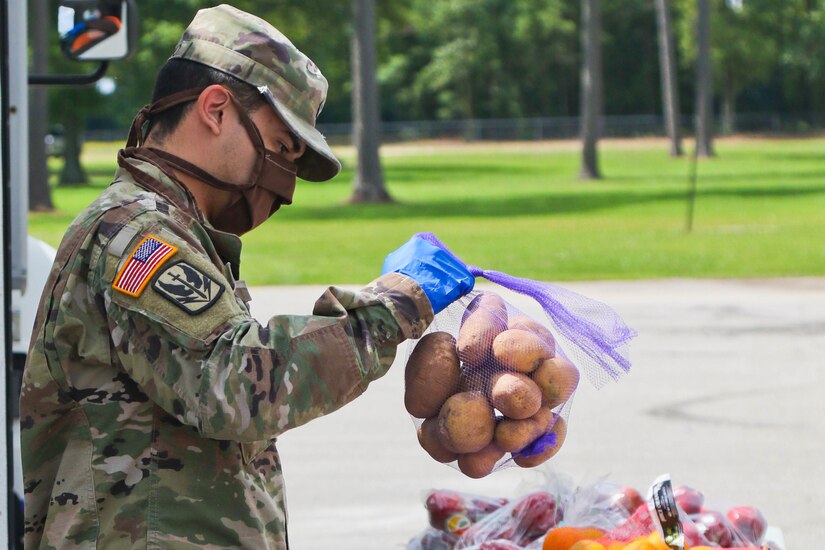
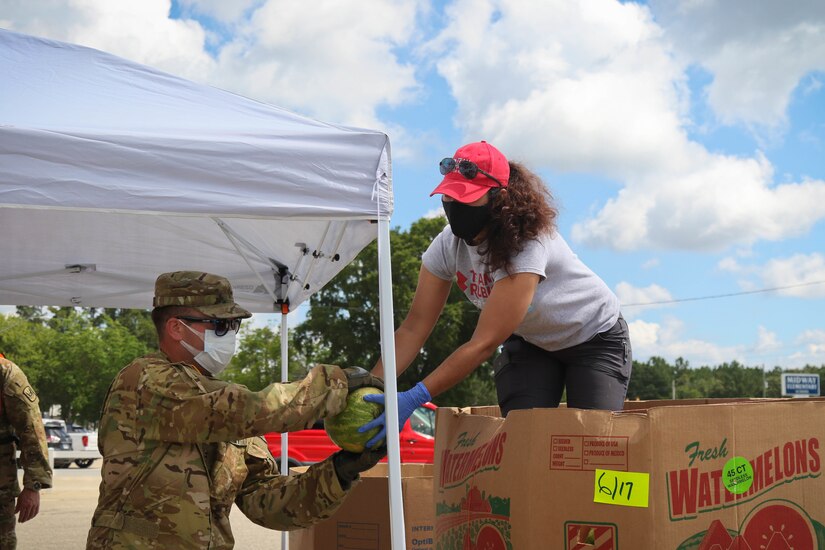
"It's a wonderful working relationship," Norris said. "The camaraderie these groups have is absolutely astounding."
Team Rubicon's efforts have made a tremendous impact in helping with COVID-19 relief operations. Volunteers from across the state gathered to dedicate their time and help fellow Tar Heels in need.
"It's been a pretty amazing dynamic," Claudia Suarez, a volunteer for Team Rubicon, said. "As a volunteer I've worked with the National Guard in the Patriot Southeast exercise and now here at the food bank. We're two different organizations, but we have similar missions and similar goals as humans."
(Army Spc. Hannah Tarkelly is assigned to the 382nd Public Affairs Detachment.)
Sports Heroes Who Served: Once an Olympic Hopeful, Army Captain Finds Victory in Nursing
Kristi Koplin has an impressive athletic background in track and field. She currently holds Southern Utah University's school record in the hammer throw, discus and weight throw. She was an alternate in the 2014 Olympics and is a former member of the Army's World Class Athlete Program in the bobsled.
These days Koplin is experiencing victory as a captain in the Army Nursing Corps with the 328th Field Hospital at Fort Douglas, Utah; a nurse at Urgent Care in Heber City and Park City, Utah; and a graduate of U.S. Army Airborne School.

In 2014, Koplin was selected as an alternate in the Winter Olympics in Sochi, Russia. For the next three years she competed on the North American and World Cup circuits. In 2018 and 2019, she began training for the 2022 Winter Olympics in Beijing, China.
In early January 2020, Koplin crashed during her second-to-last run of the North American Cup Bobsled and Skeleton in Lake Placid, New York, suffering head and neck injuries.
"I was knocked unconscious and woke up with the bobsled smashing my head against the ice and crushing my neck," she said during a recent interview with DOD News. "The crash ended my season early and I left for home to recover. By some miracle, I was not seriously injured."
Koplin announced June 23 that she's retiring from the sport.
"I still have concerns about my brain health. I have suffered a few concussions and I worry about the cumulative effect of these," she said. "I love bobsledding so much, the speed and racing, the opportunity to represent our nation as an athlete and the process of working towards a goal that I have been envisioning for a large part of my life. However, I also value my health and the decision has been something weighing on me since the accident."
"I am always looking forward to my next dream to chase. I am absolutely positive that everything works out exactly like it is supposed to," she added.
Bobsled can be a dangerous sport where speeds often exceed 75 mph. A number of athletes have been killed and most have experienced mild to severe injuries in crashes.
These days Koplin is very busy nursing and dealing with COVID-19 patients.
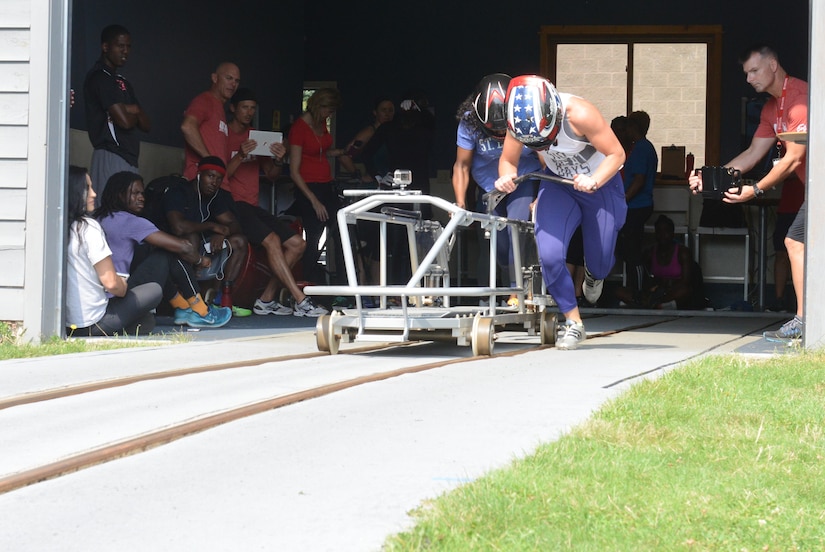
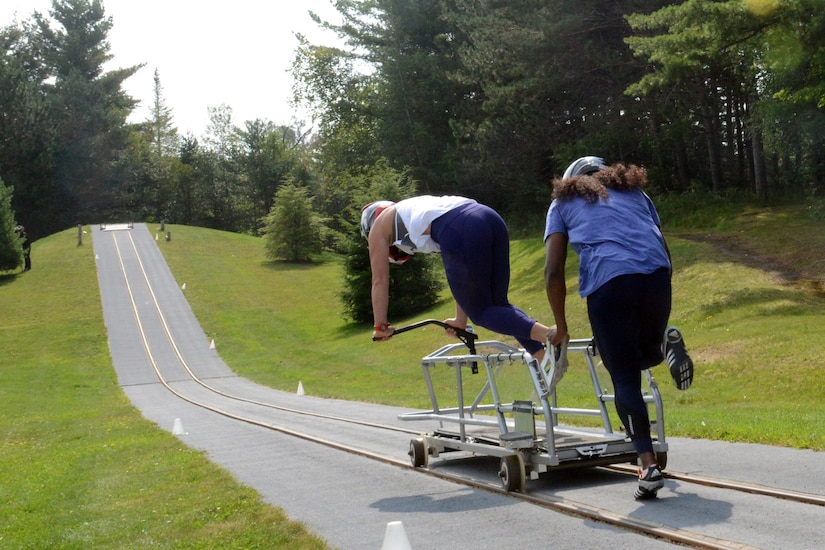
"I remember the day when they announced that two of the Utah Jazz [basketball] players had tested positive and the entire NBA season would be postponed," she said, referring to the National Basketball Association. "The news itself shocked me. The virus felt like it had hit home. From that point forward, everything changed."
The Urgent Care in Park City became one of the nation's first testing sites for COVID-19, she said. A lot of people tested positive in the area because it's a tourist destination for international travelers, particularly during the Sundance Film Festival, which took place in January and February, as the coronavirus was beginning to rapidly spread.
About that time, she said "We started testing people and educating the community about how to stay safe. With all the unknowns and uncertainty, I could feel the panic emoting from most of the patients I saw."
"My focus shifted," she continued. "I was no longer worried about my
recovery from the bobsled injury but how to react to this unknown virus
invading our lives."
Koplin said some of her most rewarding experiences were caring for
wounded and injured soldiers returning from Iraq and Afghanistan at
Landstuhl Regional Medical Center in Germany.
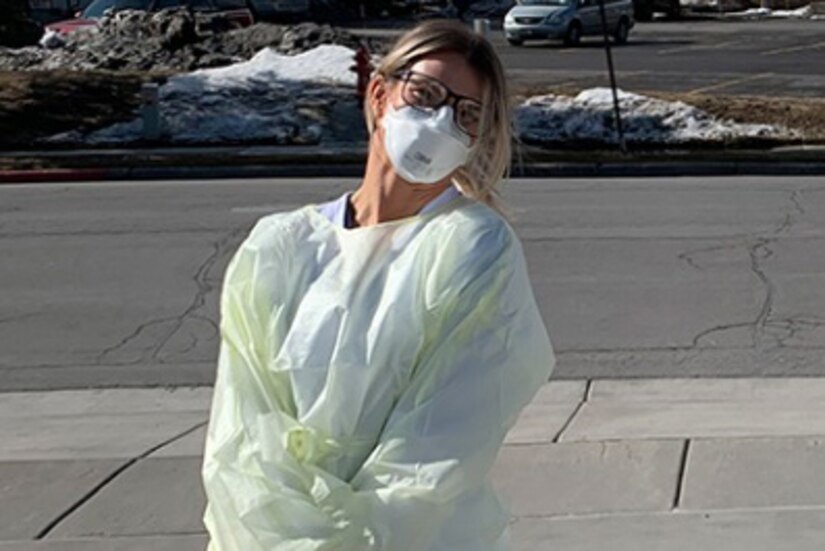
Being a nurse has been a good fit for her Olympic ambitions too, she said. Her training gives her an appreciation and understanding of how the body works and the important roles played by exercise and nutrition.
Also, her expertise was occasionally needed during training, such as when a bobsled crashes and once when an athlete from another sport was injured by a javelin.
As a former member of the World Class Athletic Program, Koplin urges others to use that organization as a means for achieving their dreams. She said there are perhaps many soldiers who have it in them to compete and would love to become Olympians, but don't realize how easy it is to apply, simply by visiting the WCAP website, looking up the criteria for a chosen sport and filling out an application.
Koplin mentioned that even with drive and determination, she would have struggled without the support of WCAP in terms of coaching, providing first-class training facilities and financing. "Being in WCAP took away any worries so I could focus 100% on training."
There are several factors that aspiring athletes should consider, she said. First and foremost, the person should be a good soldier. While training, it is up to each soldier to continue to meet the Army's requirements, including the physical fitness test and annual weapons qualification. Also, living the Army values, she said.
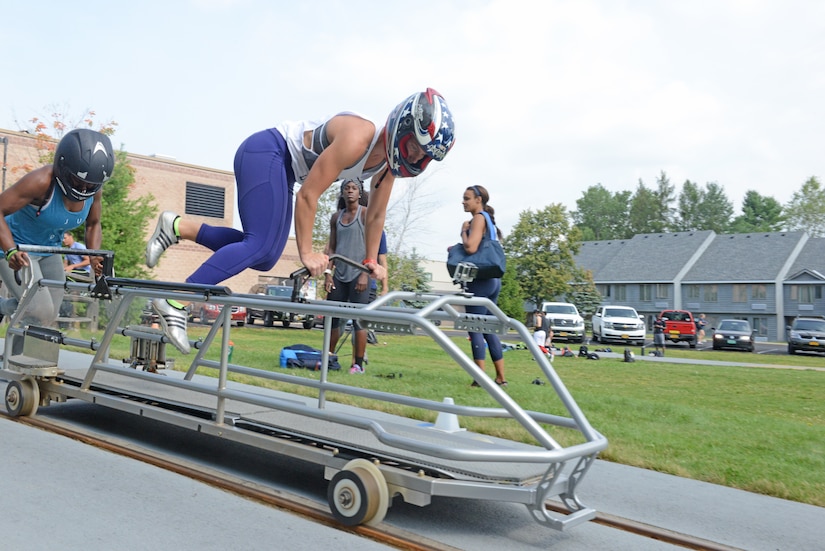
Training and diet play an enormous part too, she said, noting that she does rigorous workouts with weights and sprinting six days a week.
One final factor that Koplin said it takes — and she hesitated to mention it for fear of sounding mean — is genetics.
"No matter how self-motivated and hard-working you are, if you don't have the genes for your chosen sport, you won't succeed," she said.
